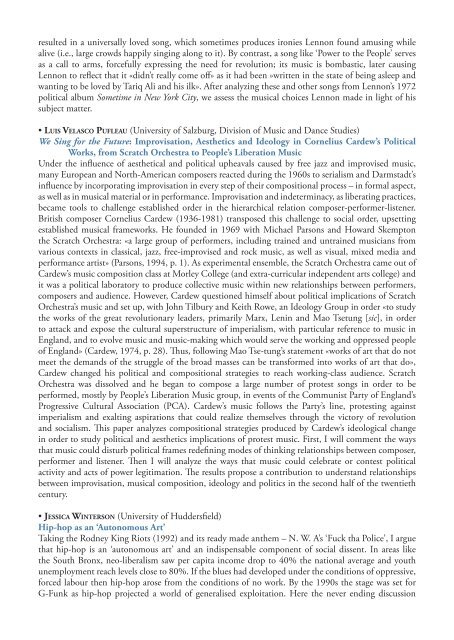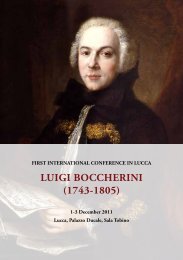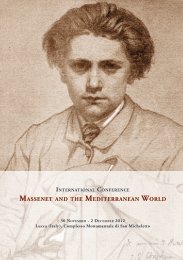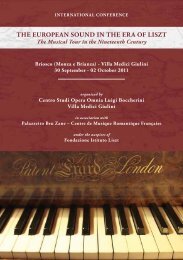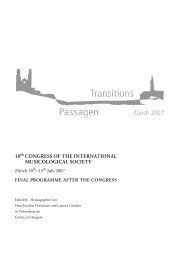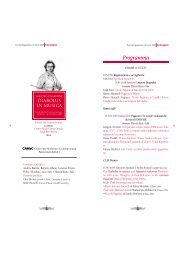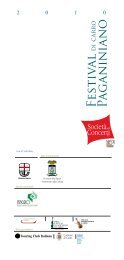PROGRAMME - Centro Studi Opera Omnia Luigi Boccherini
PROGRAMME - Centro Studi Opera Omnia Luigi Boccherini
PROGRAMME - Centro Studi Opera Omnia Luigi Boccherini
You also want an ePaper? Increase the reach of your titles
YUMPU automatically turns print PDFs into web optimized ePapers that Google loves.
esulted in a universally loved song, which sometimes produces ironies Lennon found amusing whilealive (i.e., large crowds happily singing along to it). By contrast, a song like ‘Power to the People’ servesas a call to arms, forcefully expressing the need for revolution; its music is bombastic, later causingLennon to reflect that it «didn’t really come off» as it had been »written in the state of being asleep andwanting to be loved by Tariq Ali and his ilk». After analyzing these and other songs from Lennon’s 1972political album Sometime in New York City, we assess the musical choices Lennon made in light of hissubject matter.• Luis Velasco Pufleau (University of Salzburg, Division of Music and Dance <strong>Studi</strong>es)We Sing for the Future: Improvisation, Aesthetics and Ideology in Cornelius Cardew’s PoliticalWorks, from Scratch Orchestra to People’s Liberation MusicUnder the influence of aesthetical and political upheavals caused by free jazz and improvised music,many European and North-American composers reacted during the 1960s to serialism and Darmstadt’sinfluence by incorporating improvisation in every step of their compositional process – in formal aspect,as well as in musical material or in performance. Improvisation and indeterminacy, as liberating practices,became tools to challenge established order in the hierarchical relation composer-performer-listener.British composer Cornelius Cardew (1936-1981) transposed this challenge to social order, upsettingestablished musical frameworks. He founded in 1969 with Michael Parsons and Howard Skemptonthe Scratch Orchestra: «a large group of performers, including trained and untrained musicians fromvarious contexts in classical, jazz, free-improvised and rock music, as well as visual, mixed media andperformance artist» (Parsons, 1994, p. 1). As experimental ensemble, the Scratch Orchestra came out ofCardew’s music composition class at Morley College (and extra-curricular independent arts college) andit was a political laboratory to produce collective music within new relationships between performers,composers and audience. However, Cardew questioned himself about political implications of ScratchOrchestra’s music and set up, with John Tilbury and Keith Rowe, an Ideology Group in order «to studythe works of the great revolutionary leaders, primarily Marx, Lenin and Mao Tsetung [sic], in orderto attack and expose the cultural superstructure of imperialism, with particular reference to music inEngland, and to evolve music and music-making which would serve the working and oppressed peopleof England» (Cardew, 1974, p. 28). Thus, following Mao Tse-tung’s statement «works of art that do notmeet the demands of the struggle of the broad masses can be transformed into works of art that do»,Cardew changed his political and compositional strategies to reach working-class audience. ScratchOrchestra was dissolved and he began to compose a large number of protest songs in order to beperformed, mostly by People’s Liberation Music group, in events of the Communist Party of England’sProgressive Cultural Association (PCA). Cardew’s music follows the Party’s line, protesting againstimperialism and exalting aspirations that could realize themselves through the victory of revolutionand socialism. This paper analyzes compositional strategies produced by Cardew’s ideological changein order to study political and aesthetics implications of protest music. First, I will comment the waysthat music could disturb political frames redefining modes of thinking relationships between composer,performer and listener. Then I will analyze the ways that music could celebrate or contest politicalactivity and acts of power legitimation. The results propose a contribution to understand relationshipsbetween improvisation, musical composition, ideology and politics in the second half of the twentiethcentury.• Jessica Winterson (University of Huddersfield)Hip-hop as an ‘Autonomous Art’Taking the Rodney King Riots (1992) and its ready made anthem – N. W. A’s ‘Fuck tha Police’, I arguethat hip-hop is an ‘autonomous art’ and an indispensable component of social dissent. In areas likethe South Bronx, neo-liberalism saw per capita income drop to 40% the national average and youthunemployment reach levels close to 80%. If the blues had developed under the conditions of oppressive,forced labour then hip-hop arose from the conditions of no work. By the 1990s the stage was set forG-Funk as hip-hop projected a world of generalised exploitation. Here the never ending discussion


